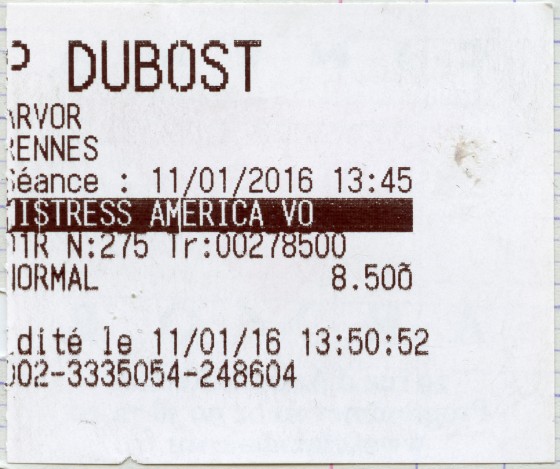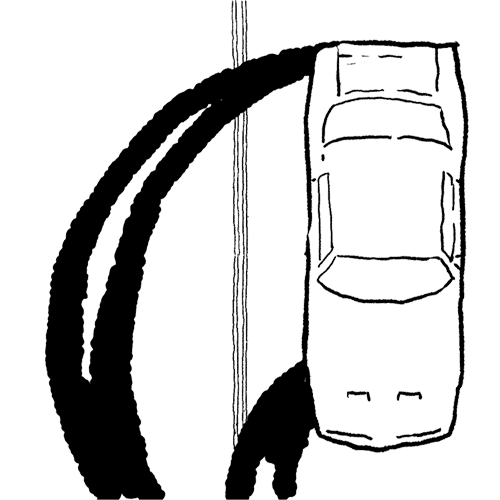Mistress America

Compression on a grand scale
As usual, less to say about good films than bad, but in the case of Mistress America, I will make elegance the point, and then fail to live up to it. This is a concise film. We are introduced to the discomfort of the first week of college for Ms. Lola Kirke in a series of vignettes. The ideas and turns contained within would make any other filmmaker so envious they would have been stretched out to a trilogy. Twenty minutes into the film, I looked at my watch as I seemed to be watching what could only be the third act. My watch told me that in fact I was: seventy minutes had past. It was wonderful: I had just paid €8 to shorten my life.

This is a seeming, and probably actual, contradiction – that a film brimming with ideas and knowing how not to let them linger, actually makes the experience of time shorten. For someone like me, this is imperative. If I only saw films like Foxcatcher or White God I would be 142 years old.
People say headers are good for hits on the CEO of memes or something, but I used them for SotL, so I’m using them here.
Performance and narcissism
What’s especially interesting about this film is that it contains a pleasant narcissist. Ms. Greta Gerwig plays a character (see Foxcatcher, etc. above) I have a history of not caring for. In film, in the film business, in the film business to justify their inclusion in film and so on. And there’s something to be said for the wit…literally. ‘To be said’ can be interpreted as future tense, so skip ahead. You’ve got headers now!

When confronted with a short, good film with no flab, it puts one in mind of the doctor prolonging the life of the aesthetic. What’s the point if you can’t have cake? And so to the Cinema Arvor: sell snacks! I mean, I had to buy double the chocolate for the trip home.
But like Mr. James Garner, Mr. Hugh Laurie, etc, before her, this is a staggering performance of what should otherwise be a detestable character. Easily and away the best non-vocal only turn of the year, this is the part Ms. Cate Blanchett wishes she had played, and Mr. Woody Allen wishes he had written. As appropriate come awards season: utterly ignored. That’s how good.
As we are introduced her at Times Square, her attempt at a grand entrance deteriorates rapidly into an internal shuffle between elegance and speed, trying to appear cool and make it down the stairs quickly to be cool simultaneously. It’s a terrific introduction of a character I don’t think I’ve seen before: desperate surface awkwardness that embellishes and discounts her flamboyant confidence. There’s further the sense that at any moment she could explode, and, to the film’s credit, she never does.
Ms. Gerwig’s excellence comes down to a review I read about one of the lines that said reviewer found terribly clever: ‘I’m autodidact. Do you know what that is? It’s one of the things I self taught myself!’ Thought I, yes, that’s okay, but a bit coy. Almost didn’t see the film. But the reviewer didn’t know why the line made it in: Ms. Gerwig nails it, and makes it seem like anyone could just repeat it. Like he did.
Like I just did. Goddammit.
.zip
And the lesson that this film, itself also one of the year’s best, is the elegance of shorthand. Information is given at double speed, with other information layered on top of it. Ms. Kirke, after said compressed introduction, meets a boy, doesn’t really like him, maybe she does, but now he’s seeing someone else in the space of a minute, the entirety of a first act in most films. I know you’re not supposed to use voiceover…
…wait a second. Who said that? It’s not even remotely true. Voiceover is inherently filmic, something that can’t be replicated in any other medium, the simultaneity of image and, if it’s good, contrapuntal language. If voiceover is bad, how does one explain Sunset Boulevard or Election or the good version of Blade Runner? It’s like saying that stories should be told in three acts…ah.
I see now.
…but it works here because of that counterpoint (am I allowed to access a parenthetical after the fact? I don’t know. Ask the guys who believe in act structure). As Ms. Kirke writes her version of Ms. Gerwig as a short story, we see other aspects of the character, other moments. It doesn’t hurt that the writing is, as throughout, quite good. Hence:
Compression is wit
Afterwards I heard a woman remark that the film was mediocre, which would have surprised me, but the subtitles sucked. Ms. Gerwig explaining: ‘There’s nothing I don’t know about myself. That’s why I can’t go to therapy.’ works, even without inflection. It’s translation: ‘Je me connaître. J’ai pas besoin de thérapie’ (‘I know myself. I don’t need therapy’) is an we-included-some-of-the-words! translation. Yet the exclusion even of that single word ‘can’ sticks in the gut for all the lost non-english speaking fans (The thought that our francophone didn’t like it is, of course, impossible to consider).
To all film distributors: this is an art house film. Your audience requires more than the care of a google translate for your I Can’t Believe There’s No VO Version of Goosebumps.
Damn. I really wanted to see that in the theater.
They, yes even in other countries, need a comedy to have…jokes! Instead we get the usual literalizations of dialog. The translations are quite shoddy in France. Even the subtitles for the deaf and hard of hearing, which could actually just use the script, are pared down to the barest communicative language. When a character says ‘yes’ twice, it matters.
This film, possibly the best of 2015, is certainly the best written. It’s easy to notice, and then dismiss, that it has jokes. Great. But here’s something more shocking, it has dialog. It’s as if they took time to write it. One line stands out on this account: ‘I don’t know if you’re a zen master or a sociopath’, moderate to clever, but they gave it to Ms. Gerwig to say. That she would say something about somebody else that applies to her is a jaw-dropping delight.
When All Is Revealed (that Ms. Kirke has written a slightly unflattering portrait of Ms. Gerwig), we get their complete reaction by the way the other characters rush through the page turns. This desire to get to the next bit, or moment or joke is itself, funny.
Conclusion
Coming up with conclusions is difficult. Besides I have headers now.
The Take

$21.00
The Lonely Comments Section

 [logo]
[logo]

